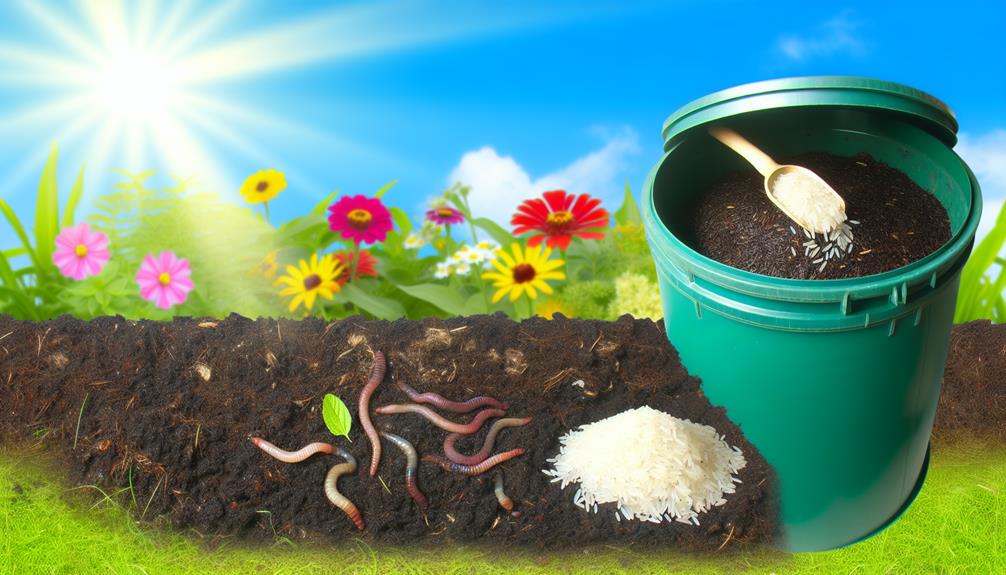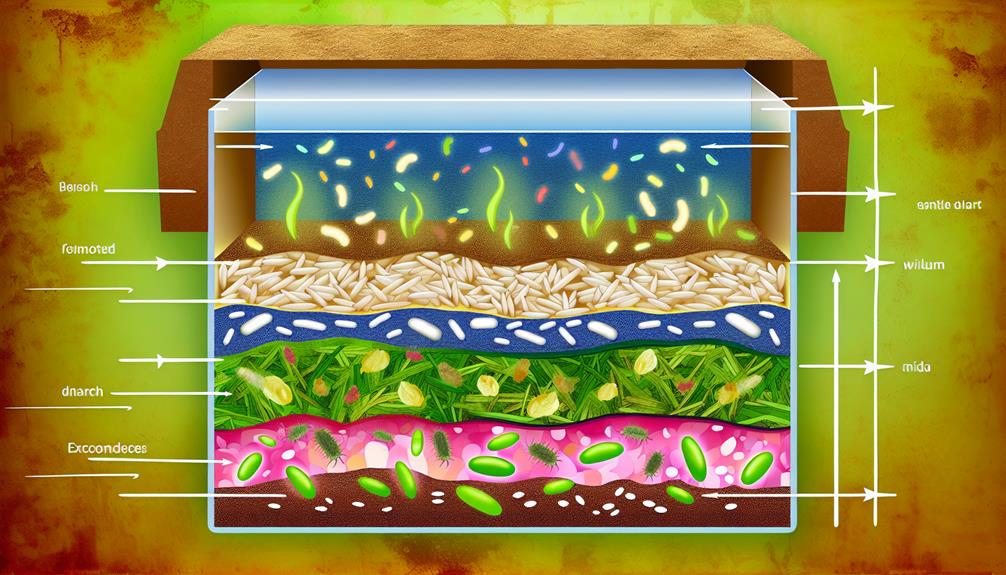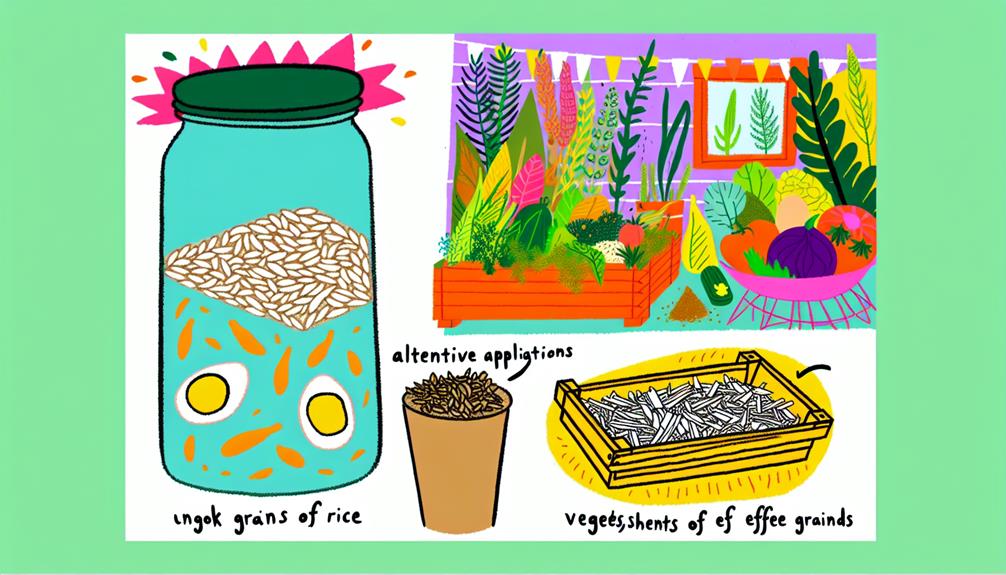

Yes, you can compost uncooked rice, but you need to manage it carefully to avoid problems. Uncooked rice adds essential nutrients and boosts microbial activity, enhancing soil health. However, it can attract pests and create moisture imbalances.
To prevent these issues, add rice in small quantities, mix it with brown materials, and make sure your compost remains as moist as a damp sponge. Turn the compost regularly and cover the rice to deter rodents and insects. If done right, using uncooked rice can benefit your compost greatly. For more tips and alternatives, keep exploring other practical composting strategies.
One major benefit of composting uncooked rice is that it adds essential nutrients to your compost pile. When you incorporate uncooked rice into your compost, you’re providing a nutrient boost that can greatly enrich your soil. This is especially valuable if you’re aiming to create a thriving garden community. Uncooked rice breaks down to release important minerals such as nitrogen, phosphorus, and potassium, which are crucial for plant growth and soil enrichment.
To get started, sprinkle the uncooked rice throughout your compost pile, ensuring it’s well-mixed with other organic materials. This helps to balance the compost and prevents clumping, which could slow down the decomposition process. By doing this, you’re contributing to a healthier, more nutrient-rich compost that will ultimately benefit your garden.
Furthermore, using uncooked rice in your compost encourages microbial activity, which is essential for breaking down organic matter. These microbes work tirelessly to transform your compost into a rich, fertile soil amendment. By regularly adding uncooked rice, you’re fostering a vibrant compost ecosystem that will enhance your garden’s health and productivity.
Also Read: Can You Compost Bones?
While incorporating uncooked rice into your compost offers numerous benefits, it’s important to be aware of the potential problems it can introduce. One of the main concerns is pest attraction. Uncooked rice can attract rodents, insects, and even birds, which can become a nuisance and disrupt your composting process.
Another issue is moisture imbalance. Rice tends to absorb water, which can lead to an overly wet compost pile, potentially causing it to become anaerobic and smelly.
Here are some specific issues you might face:
Incorporating uncooked rice into your compost can greatly impact its overall balance and effectiveness. When you add uncooked rice, it acts as a carbon-rich material that fuels microbial activity. These microbes are essential for breaking down organic matter, and they thrive on the starches found in rice. This increased microbial activity accelerates the decomposition process, leading to richer compost.

However, it’s essential to mention that uncooked rice can also attract pests like rodents and insects. These pests can disrupt the composting process and make your compost pile less pleasant to manage. To minimize this risk, make sure you mix the rice well with other compost materials, like vegetable scraps and leaves, to discourage pests.
Uncooked rice can also influence the moisture level in your compost. Rice tends to absorb water, which can help balance overly wet compost piles. On the flip side, if your compost is too dry, the rice may not break down as effectively.
Monitoring moisture levels is critical to maintaining ideal conditions for microbial activity and soil enrichment.
Also Read: Can You Compost Body Wash?
To effectively add uncooked rice to your compost, make sure you mix it thoroughly with other organic materials. This guarantees even decomposition and prevents clumping. Without proper integration, rice can create compact pockets, leading to moisture management issues and attracting pests.
Incorporate these best practices:
Also Read: Can You Compost Blood?
If composting rice doesn’t appeal to you, there are other sustainable methods to handle uncooked rice waste. One practical option is rice donation. Many food banks and community kitchens accept donations of non-perishable items like uncooked rice. By donating, you contribute to a collective effort to support those in need, fostering a sense of community.

Another alternative is proper rice storage to extend its shelf life. Store your uncooked rice in airtight containers to protect it from pests and moisture. Keep it in a cool, dark place, guaranteeing it stays fresh for future use. This method not only prevents waste but also ensures you always have rice on hand for meals.
Additionally, consider repurposing rice in creative ways. You can use it in crafts, such as making heat packs or sensory play activities for children. These alternatives keep rice out of the compost bin and provide practical or enjoyable uses.
Yes, you can compost cooked rice, but be cautious. Its moisture content can attract pests and cause anaerobic conditions. To compost it successfully, mix it well with dry materials and maintain aerobic conditions for proper decomposition.
Uncooked rice’s decomposition rate depends on soil microbes. With an active microbial community, it can take several months to break down. Be patient, and you’ll eventually see your soil enriched by their hard work.
Yes, composting rice can attract pests and rodents. To keep your compost community pest-free, use pest deterrents like citrus peels or coffee grounds, and practice rodent control by burying rice deeper in the pile.
Yes, rice can contribute to the nutrient balance of your compost. It boosts microbial activity, breaking down organic matter faster. By composting rice, you’re enhancing your community garden’s soil health and fostering a sense of belonging.
You should rinse the rice before composting it. Rice washing reduces the risk of bacterial growth, making your compost healthier. You’ll contribute to a thriving, nutrient-rich compost pile that benefits your community garden or backyard oasis.
Composting uncooked rice has its benefits, but it also poses challenges. To avoid issues like pests and mold, mix rice with other compost materials and maintain proper moisture levels.
Consider alternatives like adding rice to a worm bin or using it in a bokashi system. By following best practices, you can effectively compost rice while maintaining a healthy compost pile.
Remember, balance and monitoring are key to successful composting.
